|
|
|
Sort Order |
|
|
|
Items / Page
|
|
|
|
|
|
|
| Srl | Item |
| 1 |
ID:
096522
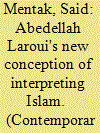

|
|
|
| 2 |
ID:
068922
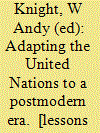

|
|
|
|
|
| Publication |
Hampshire, Palgrave Macmillan, 2001.
|
| Description |
xxiv, 272p.
|
| Series |
Global issues series
|
| Standard Number |
0333801504
|
|
|
|
|
|
|
|
|
|
|
|
Copies: C:1/I:0,R:0,Q:0
Circulation
| Accession# | Call# | Current Location | Status | Policy | Location |
| 044350 | 341.23/KNI 044350 | Main | On Shelf | General | |
|
|
|
|
| 3 |
ID:
161095
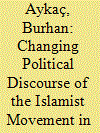

|
|
|
|
|
| Summary/Abstract |
This article deals with the Islamist movement and its ideology throughout the process of modernization and analyzes the political discourse of the Islamists about a world of consumption and the Islamic lifestyle. The article depicts the course of the Islamist political discourse from the beginning. The political discourse of the Islamists showed variations depending on the changing domestic and foreign conjunctions. Developed through a defensive understanding in the final period of the Ottoman State, the discourse of the Islamist movement underwent further changes in the following periods, which was influenced by the internal conditions of the country and developments outside. As the Islamist movement has always adapted to modern political life, political and intellectual changes in the modern period caused the Islamist discourse to change politically and acquire an appropriate language for the new situation.
|
|
|
|
|
|
|
|
|
|
|
|
|
|
|
|
| 4 |
ID:
024732


|
|
|
|
|
| Publication |
DelhI, Arnold-Heinemann, 1973.
|
| Description |
xiii, 507p.
|
| Standard Number |
043580664
|
|
|
|
|
|
|
|
|
|
|
|
Copies: C:1/I:0,R:0,Q:0
Circulation
| Accession# | Call# | Current Location | Status | Policy | Location |
| 015394 | 303.49/BEL 015394 | Main | On Shelf | General | |
|
|
|
|
| 5 |
ID:
143043


|
|
|
|
|
| Publication |
California, Stanford University Press, 1990.
|
| Description |
xi, 186p.:figures, tablespbk
|
| Standard Number |
0804718911
|
|
|
|
|
|
|
|
|
|
|
|
Copies: C:1/I:0,R:0,Q:0
Circulation
| Accession# | Call# | Current Location | Status | Policy | Location |
| 058432 | 303.44/GID 058432 | Main | On Shelf | General | |
|
|
|
|
| 6 |
ID:
191035
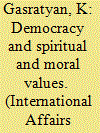

|
|
|
|
|
| Summary/Abstract |
THE development of democratic institutions has gone hand in hand with the evolution of human ideas about spiritual and moral values, natural rights, freedom, justice, and systems of government. It has also been simultaneous with the development of civil (written) law...
|
|
|
|
|
|
|
|
|
|
|
|
|
|
|
|
| 7 |
ID:
164745
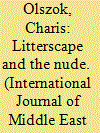

|
|
|
|
|
| Summary/Abstract |
Mansur Bushnaf's al-ʿIlka (Chewing Gum; 2008) is the author's sole novel, born of his twelve-year imprisonment in a Libyan jail, and his reflection on the nation's subjection to international marginalization and dictatorial rule under Gaddafi. The novel is centered on a 19th-century nude which confounds all who encounter it, and which lies neglected in a corner of Tripoli's Red Palace Museum. Through this statue, and the novel's broader poetics of stasis and “chewing,” I explore how turāth in Bushnaf's work, and wider Libyan fiction, is depicted through its abject vulnerability and exposure to historical vicissitudes, reflecting the parallel exclusion of human lives from rights and agency. In al-ʿIlka, I examine how this is formulated into a defamiliarizing perspective on the postmodern, and on historical trauma and erasure, in which the possibility of narrative is a driving concern, rooted in existential reflection, as well as the real precarity of those who tell stories in Libya.
|
|
|
|
|
|
|
|
|
|
|
|
|
|
|
|
| 8 |
ID:
000947
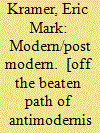

|
|
|
|
|
| Publication |
Westport, Praeger Publishers, 1997.
|
| Description |
xxv, 222p.
|
| Standard Number |
0275957586
|
|
|
|
|
|
|
|
|
|
|
|
Copies: C:1/I:0,R:0,Q:0
Circulation
| Accession# | Call# | Current Location | Status | Policy | Location |
| 039407 | 149/KRA 039407 | Main | On Shelf | General | |
|
|
|
|
| 9 |
ID:
108807
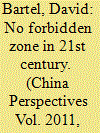

|
|
|
| 10 |
ID:
050942
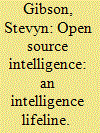

|
|
|
| 11 |
ID:
047838
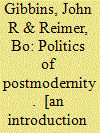

|
|
|
|
|
| Publication |
New Delhi, Sage Publications, 1999.
|
| Description |
iv, 204p.
|
| Standard Number |
0761952233
|
|
|
|
|
|
|
|
|
|
|
|
Copies: C:1/I:0,R:0,Q:0
Circulation
| Accession# | Call# | Current Location | Status | Policy | Location |
| 043863 | 320.01/GIB 043863 | Main | On Shelf | General | |
|
|
|
|
| 12 |
ID:
024733


|
|
|
|
|
| Publication |
Cambridge, Polity Press, 1989.
|
| Description |
viii, 232 p.
|
| Standard Number |
0745606016
|
|
|
|
|
|
|
|
|
|
|
|
Copies: C:1/I:0,R:0,Q:0
Circulation
| Accession# | Call# | Current Location | Status | Policy | Location |
| 032197 | 303.4/NEG 032197 | Main | On Shelf | General | |
|
|
|
|
| 13 |
ID:
086299


|
|
|
|
|
| Publication |
2008.
|
| Summary/Abstract |
Since the 1990s, international relations theory (IR) has supposedly been in the grip of a 'Third Debate', this time between positivism and postmodernism. While many have cast doubt as to whether this is in fact the case, and others have argued that it is time to move beyond it, it remains true to say that the issue of positivism vs postpositivism has occupied the minds of a number of academic analysts in recent years. This article takes the more radical position of questioning whether this epistemological debate - if, indeed, one accepts that there is one - has any real import in the sense of influencing the empirical research that IR scholars actually conduct. In short, whether one embraces a positivist or a postmodernist epistemology (for example) has little practical effect upon one's empirical findings. By extension, this argument suggests that the emphasis on the philosophical underpinnings of IR, while not necessarily misconceived in and of itself, has thus far not been central to what IR scholars actually do.
|
|
|
|
|
|
|
|
|
|
|
|
|
|
|
|
| 14 |
ID:
051022
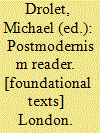

|
|
|
|
|
| Publication |
London, Routledge, 2004.
|
| Description |
ix, 332p.
|
| Standard Number |
0415160847
|
|
|
|
|
|
|
|
|
|
|
|
Copies: C:1/I:0,R:0,Q:0
Circulation
| Accession# | Call# | Current Location | Status | Policy | Location |
| 047970 | 149.97/DRO 047970 | Main | On Shelf | General | |
|
|
|
|
| 15 |
ID:
116869
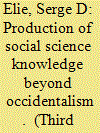

|
|
|
|
|
| Publication |
2012.
|
| Summary/Abstract |
This article makes the case for a post-exotic anthropology as an alternative disciplinary practice adapted to the emerging historical conjuncture that is reconfiguring the political and epistemic relations between different parts of the world. This is raising anew a legitimation challenge to mainstream social sciences but especially academic anthropology, as its a practice is still characterised by a chronic exoticist inflection thanks to its allegiance to the epistemology of Occidentalism. The article calls for a revision of anthropology's geo-theoretical premises in light of an emergent post-exotic historical conjuncture, which entails the abandonment of the duopoly exercised by the epistemic regimes of postmodernism and postcolonialism, in favour of a post-exotic standpoint. It suggests the adoption of mesography as the optimum means of operationalising a post-exotic anthropology as well as an alternative mode of social science knowledge production. Finally, it proposes an ethic of reciprocity to rectify the extractive fieldwork practices that sustain the illiberal politics of interpretation of academic anthropology.
|
|
|
|
|
|
|
|
|
|
|
|
|
|
|
|
| 16 |
ID:
180012


|
|
|
|
|
| Summary/Abstract |
Richard Rorty’s controversial works in various areas of epistemology, language, politics and philosophy have drawn intellectual attention worldwide. In Iran, Rorty’s own distinctive way of thinking has attracted the attention of intellectual and philosophical circles. This article explores how his thought as received by Iranian intellectuals has contributed to the development of their ongoing debate on tradition and modernity. A few Iranian intellectuals have tried to find in Rorty’s ideas a solution to what they perceive as their own society’s problems. In particular, they believe his notion of anti-foundationalism and his idea of the priority of democracy to philosophy are ways to reconcile their own traditional philosophical and doctrinal conceptions with modern democratic institutions.
|
|
|
|
|
|
|
|
|
|
|
|
|
|
|
|
| 17 |
ID:
051028
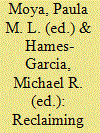

|
|
|
|
|
| Publication |
Berkeley, University of California Press, 2000.
|
| Description |
x, 354p.
|
| Standard Number |
0520223489
|
|
|
|
|
|
|
|
|
|
|
|
Copies: C:1/I:0,R:0,Q:0
Circulation
| Accession# | Call# | Current Location | Status | Policy | Location |
| 047976 | 305/MOY 047976 | Main | On Shelf | General | |
|
|
|
|
| 18 |
ID:
173126
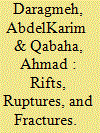

|
|
|
|
|
| Summary/Abstract |
This article responds to the relative neglect of reading Mahmoud Darwish from a postmodern perspective. Inspired by postmodern theory, we suggest that Darwish after Oslo agreements in 1993 seeks to have a displaced and dialectical encounter with the collective identity; he utilizes a transition from being into becoming, from filiation into affiliation, knowing that this transition mirrors rifts, ruptures, and fractures in the Palestinian historical and geopolitical conditions in the post-Oslo era. By looking at poems written after the Oslo Accords, which were described by Bashir Abu-Manneh as “the root cause of the disintegration and liquidation of Palestinian agency,” we argue that Darwish's persona manifests the postmodern intellectual who is tempted to leave the collective and expatriate himself to hone an independent self and thought that provides a fresh perspective and a new understanding of Palestinian collectivity. While Darwish's pre-Oslo poetry expressed a collective voice, identification, and commitment to the national narrative, after Oslo, he gets more personal and, perhaps, detached from and critical of the nationalist political entities and narratives. Building on theoretical insights from both postcolonial and postmodern intellectuals, we also articulate ways in which the dialectical relation between postcolonialism and postmodernism appears in Darwish's poetry. We find that the persona at times combines, and at other times, fluctuates between, singularity and multiplicity, certainty and suspicion, the collective and the personal, place and space, tradition and innovation, while seeking revision, transition, contingency, dynamism, fluidity in the contemporary, post-Oslo time.
|
|
|
|
|
|
|
|
|
|
|
|
|
|
|
|
| 19 |
ID:
077550


|
|
|
|
|
| Publication |
London, Sage Publications, 1995.
|
| Description |
x, 178p.
|
| Standard Number |
9780803976061
|
|
|
|
|
|
|
|
|
|
|
|
Copies: C:1/I:0,R:0,Q:0
Circulation
| Accession# | Call# | Current Location | Status | Policy | Location |
| 052399 | 306/FEA 052399 | Main | On Shelf | General | |
|
|
|
|
| 20 |
ID:
095800
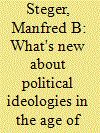

|
|
|
|
|
| Publication |
2010.
|
| Summary/Abstract |
The defeat of Nazi Germany in 1945 and the collapse of the Soviet Empire in 1991 enticed scores of Western commentators to relegate 'ideology' to the dustbin of history. Proclaiming a radically new era in human history, they argued that ideology had ended with the final triumph of liberal capitalism. This dream of a universal set of political ideas ruling the world came crashing down with the Twin Towers of the World Trade Center on 11 September 2001. Since then, influential political leaders have argued that the contest with jihadist Islamism represents much more than the military conflict. It is, as Presidents Bush and Obama put it, the 'decisive ideological struggle of our time'.1 Far from being moribund, then, competing political belief systems are alive and well in the early twenty-first century.
|
|
|
|
|
|
|
|
|
|
|
|
|
|
|
|
|
|
|
|
|